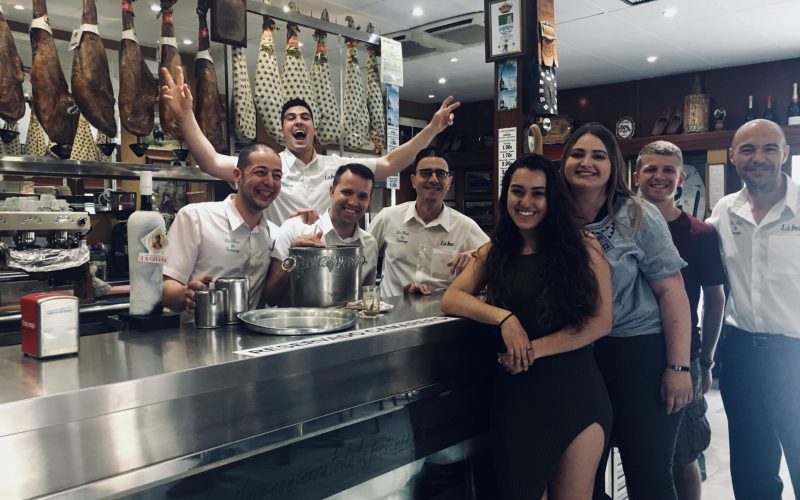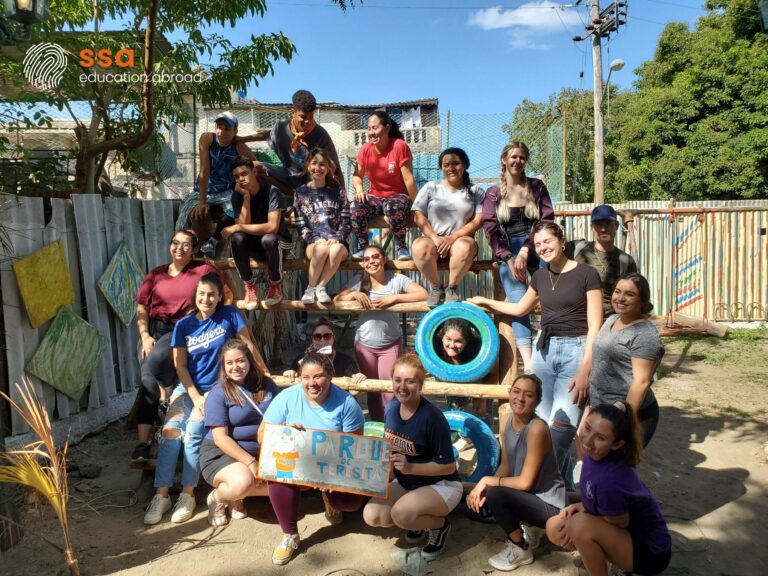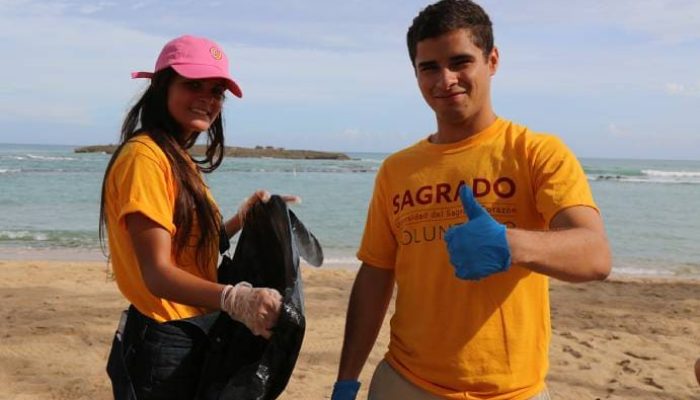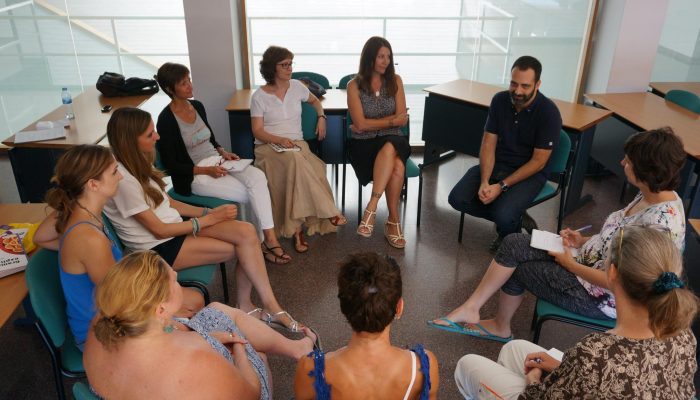Spain is a destination for tens of thousands of students annually, seeking to learn the national language while enjoying its rich culture and lifestyle.
What should you keep in mind to prepare to get the most out of this experience? We’ll discuss that and other vital topics to make sure your time in Spain is the experience of a lifetime.
In this article, we draw your attention to the following:
- Things to keep in mind ahead of time, such as the type of city or town that suits you, the climate, and the program type.
- What you should do ahead of time such as planning and learning a bit of Spanish
- Some tips to maximize Spanish learning while in Spain
Things to consider when planning to learn Spanish in Spain
Language immersion courses are a great way to learn Spanish. These are intensive courses at schools or programs that surround you with learning opportunities such as outstanding coursework, cultural excursions, and speaking partners.
Are you looking for a short stay at a language school or a for-credit program that lasts for a semester?
The Lifestyle
The lifestyle of Spain is one of the main reasons that people choose to study there. Slow down a bit – although Madrid and Barcelona certainly can move a quick pace – and enjoy a cafe, a museum, a festival, and chatting with your new friends.
Spain is filled with great places to visit. It’s a great place to live and study. Get ready to walk, though! Compared to North America, you will find more walking in Spain since its cities are older. Sidewalks can be irregular or made of cobblestone in historic districts, so have appropriate shoes.
Most flights from North America land in Madrid or Barcelona. However, if you go through another European city such as London, there are flights to smaller cities such as Seville, Alicante, and Valencia.
At least once you’re in Spain, it has a sound rail system so you’ll be able to visit plenty of nearby towns and cities to make the most of your trip.
Before you pack, keep in mind the time of year that you will travel and the part of the country to have appropriate clothing. Spain does not have sunshine everywhere, and all the time, so make sure you’re prepared! Google the typical weather for your chosen area, and you will be ready.
Where to learn Spanish in Spain – so many choices!
So, where to start for you to study Spanish in Spain? We’ve also done an in-depth article on why study Spanish abroad in Spain, but to summarize here: Spain is a large country with many regional differences, so this section should help you narrow it down.
Spain’s regions and their climates
Generally speaking, the southern half of the country has a warm-to-hot climate. You can find greener, colder temperatures in the North-central and Northwest regions (generally including the Basque Country, Asturias, Gijón, and Galicia).
The Eastern coast on the Mediterranean is similar to what you’d expect in similar latitudes in Greece and Italy — temperate winters and hot summers. The Northeast area known as Catalonia (Cataluña) includes Barcelona and Girona and is a popular destination for tourists though not so much for students wishing to learn Spanish.
- Read more: best universities in Spain for international students
- Read more: should I study abroad?
“Spanish” isn’t all they speak in Spain
What other languages do they speak in Spain? Many do not realize that so many different languages exist in Spain. They date back to the Middle Ages when various kingdoms and principalities were brought under Madrid’s centralized rule.
The Catalán language (Catalonian) spoken in and around Barcelona is the source of regional pride and some political tension, making that region less popular for Spanish language students.
Also, the Basque Country has its own, non-romance language, and there are also separate languages in Galicia and the Valencian Community (related to Catalán).
In the largest two cities there, Valencia and Alicante, the national Spanish language predominates, making them good learning destinations. However, in small towns, the local Valencian language may be as common.
City size
Consider the lifestyle and cost of living of cities that you consider. Cities such as Madrid have many attractions and cultural life, but the cost of living is higher. There can also be an advantage to the slower lifestyle in smaller cities such as Seville or Alicante in the South. People can be more patient to practice with you in smaller cities and towns.
Perhaps you want the beach life of a city such as Málaga or Marbella. Both are small and easy to get around, but there are many tourists and foreigners in residence.
Madrid is the most significant large city for learning Spanish. It also has the advantage of many cultural and sporting offerings. It is more expensive than smaller cities and has a faster pace if these are essential criteria for you.
Tips for learning Spanish in Spain
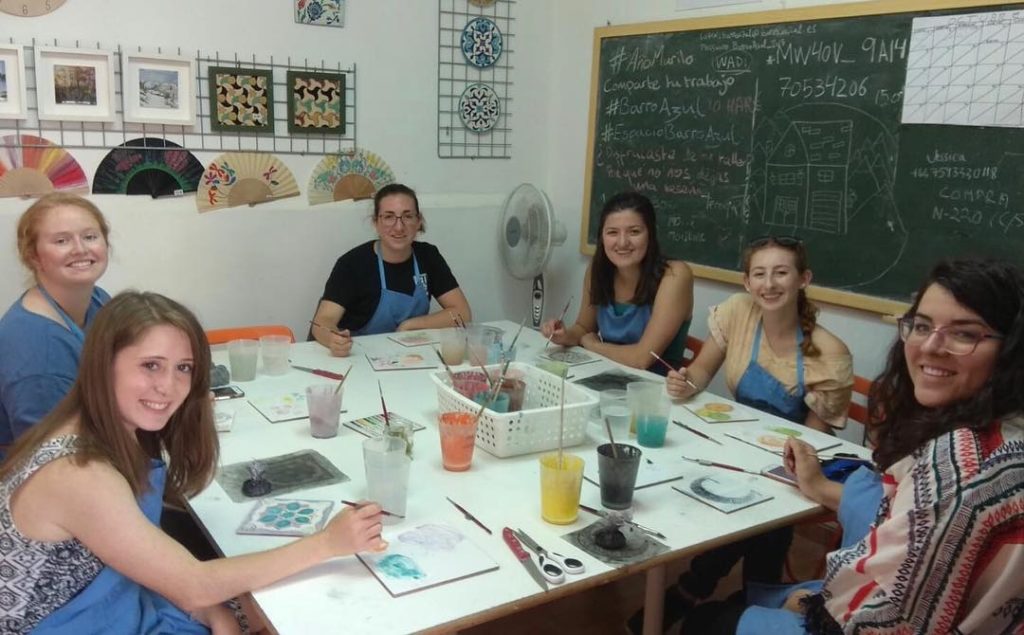
There Are Four Components of Fluency – Reading, writing, speaking, listening.
All of these are important but consider which ones matter most to you. Some commercial language schools focus primarily on oral skills, which is OK if you need it.
For-credit programs such as https://ssabroad.org/ emphasize more reading and writing than most language schools to give you the chance to develop all four areas of fluency in your stay.
Learn some Spanish before you go away
Taking Spanish classes beforehand (community colleges or adult education courses, for example) is always useful. Some people do not have time for in-person instruction, so they use online learning programs. If you’re a university student, taking some for-credit Spanish classes at your school ahead of time will help you to get the most out of your study abroad program.
Focus on your language learning goals
What is it that you are looking for? All-around fluency and the ability to read and write well? Mostly conversational proficiency to interact in work settings? These goals can help you determine what the right program for you is.
Conversation exchanges and meetups
These can be great ways of making new friendships and getting the chance to practice your Spanish.
Even if these affinity groups are for English (or another language) practice, most people would be delighted to meet at a different time to exchange an hour of Spanish conversation for one of another language. The internet has made it easy to organize interest groups – check out these:
- Meetup.com
- Couchsurfing
- Conversation Exchange
- Tus Clases Particulares
- Local University Programs
Escuelas de Idiomas
Language schools can vary significantly in their cost and approach. Check out online reviews and their website to know more about them. You can also write them ahead of time – most are very responsive. What you want to consider beyond your budget is how intensively you wish to study, what type of instruction they use and how long you can stay.
Some people have a high budget – maybe they have funds from their employer – but a short amount of time, so they may choose one-on-one instruction for one to three weeks. Others might have several months, so they take group instruction and fewer hours per week.
Live with a host family!
At Spanish Studies Abroad, we emphasize the value of staying with host families. They are great for practicing the language. They give you a look into typical home life in Spain, and they’re great for providing useful local information.
Getting an immersive experience
Language learning and gaining impressive cultural knowledge is not confined to the classroom. Language is a part of daily life, so it’s essential to maximize your time outside of class. With our 50 years of experience, here are some of the insights that we’ve gathered over the years to improve your experience in Spain – and your Spanish!
Local media sources
Find out what is available on-line and in print. It’s excellent practice to start seeing what the local news is carrying. You can sometimes find vloggers on Youtube that visit your study abroad location, and their reports can be riveting. Once you’re in Spain, keep reading to reinforce what you are learning in your program; it’s a great new vocabulary source!
Avoid your compatriots!
Similarly, assuming you’re not an absolute beginner, try to avoid speaking English with Spaniards, classmates, or friends. Like any skill you’re trying to train yourself and switching to English lets you off the hook. Force yourself to spend most of your time around people that can boost your Spanish proficiency and avoid the trap of staying in a ¨bubble¨ with other English speakers.
Live with Spanish people
If you don’t want to live with a host family, try having Spanish roommates. Here are some excellent websites in Spain to check:
- http://segundamano.com/
- http://milanuncios.com/
- http://easypiso.com/
- www.iroommates.com
- www.valenciaflatshare.com
- www.idealista.com
Hang out with the locals
It’s not always easy to do, but one way is to find interest groups, as discussed above. Meet others that share interests that you have back home.
But another way is to frequent some of the same places. Have your coffee in the same couple of cafes each day; gather with your friends in the same pub on Friday evening etc.
That way, some of the same people that work or hang out there start to recognize you. Once you have some familiarity with them, begin to greet them in Spanish warmly.
And your friends from interest groups? See if you can find ways to hang out on the weekend, such as going for a hike, attending a festival, seeing a soccer match. Spaniards are warm and generally very welcoming, and they’ll enjoy getting to know you and teaching you about their life and culture.
Don’t be afraid to make mistakes
It’s both challenging for some people and extremely essential. You probably know how to ride a bike and, if so, you most certainly feel when you started to learn. Making mistakes is part of learning a language, and you have to be OK with looking bad to make progress.
It’s helpful to have a Spanish friend with whom you have trust and comfort – what Spaniards call ‘confianza’ – and allow this person to correct you freely when you make mistakes. Real-world, real-time corrections can help to push your Spanish fluency to the next level.
Face Your Fears
Again, you’ll look bad sometimes. But swallow your pride and converse with your host mother over breakfast, order your coffee and pastry in Spanish – put aside the “cool” to get better. You’ll be glad you did when you develop your proficiency.
Remember You Won’t Be Fluent Overnight
Patience, this takes time. It took you years to develop fluency and knowledge in your language, and the same will be valid for Spanish.
Have fun
In just about every corner of Spain, you can find parties, festivals, cafes, jokes, and laughter. And learning a language isn’t a dry science – it’s learning how to relate to millions of people in many countries without them having to communicate in your language.
Laugh, practice, laugh at yourself, practice some more, and have lots of fun as you make friends and see a fascinating country.
How to prepare before you arrive
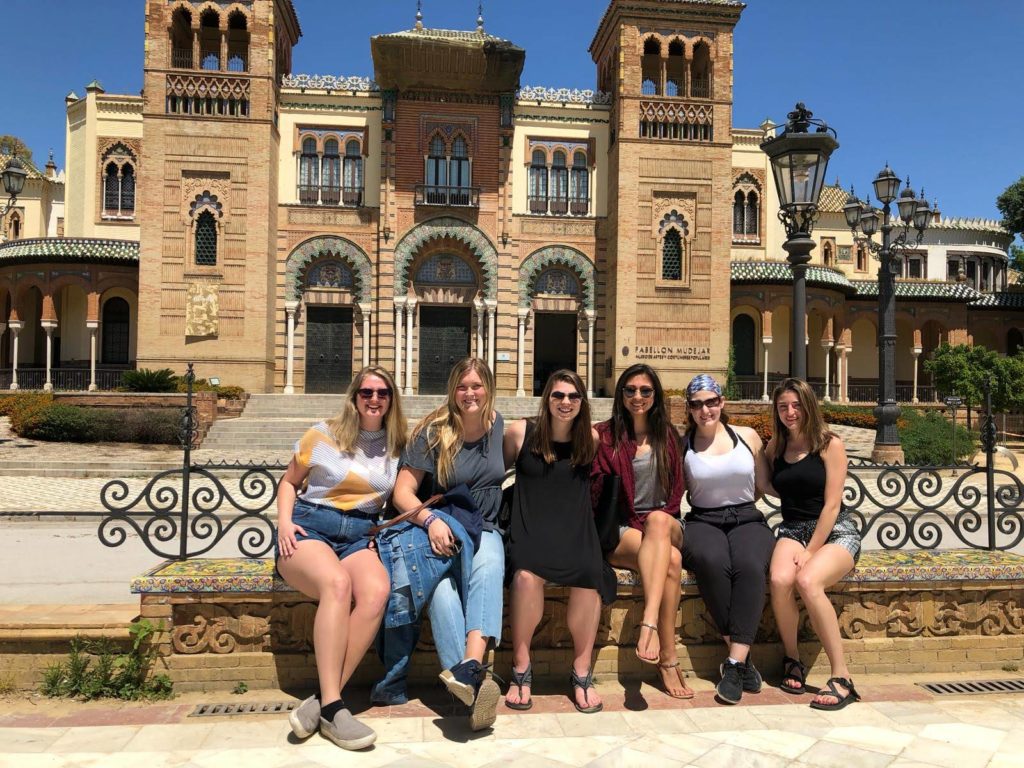
Spain Spanish will be different from what you learned at home
While you may see them, Spain is not all tapas, flamenco, and bullfights. It’s a large and complex Western European country with significant regional differences, political tensions, and many types of people, just like almost any country.
Sometimes, it can be fast-paced, high-tech, and international. At other times, it may seem slow, friendly, and family-oriented. There is no one “Spanish culture” – your experiences will be varied and different from stereotypes on most occasions.
Check out the differences between Spanish in Spain and Latin America.
While the language’s basic structures and most pronunciation remain similar between Spain and Latin America, there are key differences. Many in North America have learned Spanish with an emphasis on Mexican vocabulary, which is natural.
Some of those words and phrases may seem strange to Spaniards, so it is a good idea to study ahead of time what vocabulary words predominate in Spain for better communication. Here are some other tips to prepare you:
Pronunciation in Spain and the Vosotros form!
Vosotros is used for the 2nd-person plural – like “y’all” is used in the Southern USA. In Latin America, ‘ustedes’ is always used, and its conjugations are like 3rd-person, plural. Not understanding the use of ‘vosotros’ and its verb forms could slow you down since it’s used all the time.
Another area that trips up people used to Latin American Spanish is the pronunciation of z and c. In the following uses in Latin America, you pronounce all of these like an “s” – -ce, -ci, -za, -zo, and -zu. In Castilian Spanish, the z and c in these cases are pronounced like “th” in English. No, no one is lisping; this is how the language evolved over the centuries.
Here are some videos to practice understanding the Spanish accent and pronunciation:
So what are you waiting for? Learn Spanish in Spain today!
Learning Spanish in Spain is a great reason to live in one of the world’s richest and oldest cultures. It also is a place to enjoy yourself and the relaxing lifestyle that Spain (often) provides.
With anything, make a plan first about where you are with your Spanish and where you want to go with it. Try to get a good base of knowledge about how it works and basic vocabulary before leaving for Spain. And once you’re in Spain, soak up everything you can inside and outside of class.
Learning a language is fun because it opens doors to new experiences and friendships. Along with some work, you have to be willing to make mistakes and sometimes feel like you’re expressing yourself like a small child. But you’ll find that most Spaniards are happy that you’re interested in your language and culture.
Buena suerte. We’ll see you soon in Spain!


